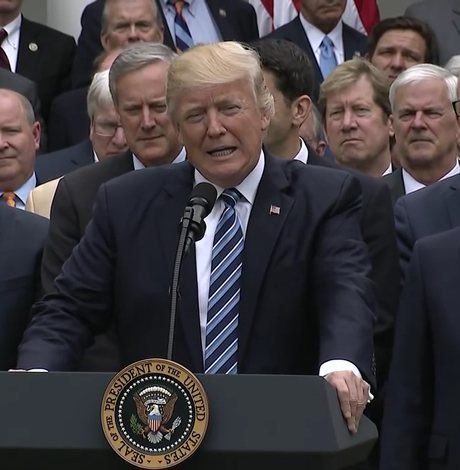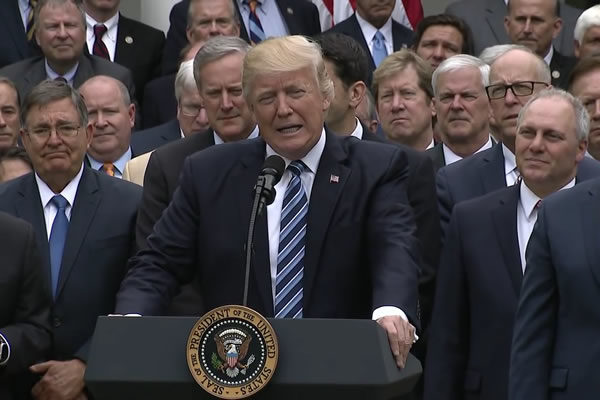National
Court deals second blow to Trump’s transgender military ban


A federal judge has blocked enforcement of President Trump’s transgender military ban. (Photo public domain)
A federal judge in Maryland has issued a ruling against President Trump’s ban on transgender people serving in the U.S. military, the second court decision against the policy.
In a 53-page decision, U.S. District Judge Marvin Garbis, an appointee of George H.W. Bush, determined a preliminary injunction against the ban is warranted because it violates the right to equal protection under the law.
“There is no doubt that the directives in the president’s memorandum set apart transgender service members to be treated differently from all other military service members,” Garbis writes. “Defendants argue that deference is owed to military personnel decisions and to the military’s policymaking process. The court does not disagree. However, the court takes note of the amici of retired military officers and former national security officials, who state ‘this is not a case where deference is warranted, in light of the absence of any considered military policymaking process, and the sharp departure from decades of precedent on the approach of the U.S. military to major personnel policy changes.”
Garbis rendered the decision on the basis that the policy against transgender people should be viewed in the courts with heightened scrutiny, but also determined the military ban would fail under the less rigorous review of the rational basis standard.
The decision is the second ruling against Trump’s transgender military ban. Last month, a federal court in D.C. blocked Trump from enforcing the policy, although left standing a provision denying gender reassignment surgery for transgender service members.
That court decision also left in place a memo by Defense Secretary James Mattis delaying a change in policy until Jan. 1 that would have allowed openly transgender people to enlist in the armed forces.
But the Garbis ruling goes further, requiring the U.S. military to admit qualified transgender people and afford gender reassignment surgery to U.S. troops who need it as part of essential medical care.
Like the earlier court decision, Garbis cites Trump’s decision to announce the transgender military ban in July via Twitter as evidence it was driven by animus, and not a well thought-out military decision.
“A capricious, arbitrary, and unqualified tweet of new policy does not trump the methodical and systematic review by military stakeholders qualified to understand the ramifications of policy changes,” Garbis writes.
The lawsuit — one of four pending challenges to the transgender military ban — was filed by the American Civil Liberties Union, ACLU of Maryland and Covington & Burling LLP on behalf of six transgender service members fearing discharge under Trump’s policy.
The plaintiffs are Petty Officer First Class Brock Stone, Senior Airman John Doe, Airman First Class Seven Ero George, Petty Officer First Class Teagan Gilbert, Staff Sergeant Kate Cole, and Technical Sergeant Tommie Parker.
Joshua Block, senior staff attorney with the ACLU’s LGBT & HIV Project, said in a statement the decision “is a victory for transgender service members across the country.”
“We’re pleased that the courts have stepped in to ensure that trans service members are treated with the dignity and respect they deserve,” Block said.
Hogan Gidley, a White House spokesperson, said the Trump administration will continue to defend the transgender military ban in court.
“The president’s directive is legal and promotes our national security,” Gidley said. “The Department of Justice will vigorously defend it.”
Lauren Ehrsam, a Justice Department spokesperson, said the Trump administration disagrees with the decision by the court.
“We disagree with the court’s ruling and are currently evaluating the next steps,” Ehrsam said. “Plaintiffs’ lawsuit challenging military service requirements is premature for many reasons, including that the Defense Department is actively reviewing such service requirements, as the president ordered, and because none of the plaintiffs have established that they will be impacted by current policies on military service.”
Army Maj. Dave Eastburn, a Pentagon spokesperson, reiterated a study is in place within the Defense Department evaluating the issue of transgender military service.
“First and foremost, the health and welfare of our service members is of the upmost importance, and one of our top priorities,” Eastburn said. “That said, current interim guidance laid forth by the secretary of defense clearly states that persons diagnosed with gender dysphoria, by a military medical professional, will continue to serve. The current policy is under review and a recommendation will be made on the conditions of that policy from the secretary to the White House sometime early next year.”

The Comings & Goings column is about sharing the professional successes of our community. We want to recognize those landing new jobs, new clients for their business, joining boards of organizations and other achievements. Please share your successes with us at [email protected].
Congratulations to Gil Pontes III on his recent appointment to the Financial Advisory Board for the City of Wilton Manors, Fla. Upon being appointed he said, “I’m honored to join the Financial Advisory Board for the City of Wilton Manors at such an important moment for our community. In my role as Executive Director of the NextGen Chamber of Commerce, I spend much of my time focused on economic growth, fiscal sustainability, and the long-term competitiveness of emerging business leaders. I look forward to bringing that perspective to Wilton Manors — helping ensure responsible stewardship of public resources while supporting a vibrant, inclusive local economy.”
Pontes is a nonprofit executive with years of development, operations, budget, management, and strategic planning experience in 501(c)(3), 501(c)(4), and political organizations. Pontes is currently executive director of NextGen, Chamber of Commerce. NextGen Chamber’s mission is to “empower emerging business leaders by generating insights, encouraging engagement, and nurturing leadership development to shape the future economy.” Prior to that he served as managing director of The Nora Project, and director of development also at The Nora Project. He has held a number of other positions including Major Gifts Officer, Thundermist Health Center, and has worked in both real estate and banking including as Business Solutions Adviser, Ironwood Financial. For three years he was a Selectman, Town of Berkley, Mass. In that role, he managed HR and general governance for town government. There were 200+ staff and 6,500 constituents. He balanced a $20,000,000 budget annually, established an Economic Development Committee, and hired the first town administrator.
Pontes earned his bachelor’s degree in political science from the University of Massachusetts, Dartmouth.
Kansas
ACLU sues Kansas over law invalidating trans residents’ IDs
A new Kansas bill requires transgender residents to have their driver’s licenses reflect their sex assigned at birth, invalidating current licenses.

Transgender people across Kansas received letters in the mail on Wednesday demanding the immediate surrender of their driver’s licenses following passage of one of the harshest transgender bathroom bans in the nation. Now the American Civil Liberties Union is filing a lawsuit to block the ban and protect transgender residents from what advocates describe as “sweeping” and “punitive” consequences.
Independent journalist Erin Reed broke the story Wednesday after lawmakers approved House Substitute for Senate Bill 244. In her reporting, Reed included a photo of the letter sent to transgender Kansans, requiring them to obtain a driver’s license that reflects their sex assigned at birth rather than the gender with which they identify.
According to the reporting, transgender Kansans must surrender their driver’s licenses and that their current credentials — regardless of expiration date — will be considered invalid upon the law’s publication. The move effectively nullifies previously issued identification documents, creating immediate uncertainty for those impacted.
House Substitute for Senate Bill 244 also stipulates that any transgender person caught driving without a valid license could face a class B misdemeanor, punishable by up to six months in jail and a $1,000 fine. That potential penalty adds a criminal dimension to what began as an administrative action. It also compounds the legal risks for transgender Kansans, as the state already requires county jails to house inmates according to sex assigned at birth — a policy that advocates say can place transgender detainees at heightened risk.
Beyond identification issues, SB 244 not only bans transgender people from using restrooms that match their gender identity in government buildings — including libraries, courthouses, state parks, hospitals, and interstate rest stops — with the possibility for criminal penalties, but also allows for what critics have described as a “bathroom bounty hunter” provision. The measure permits anyone who encounters a transgender person in a restroom — including potentially in private businesses — to sue them for large sums of money, dramatically expanding the scope of enforcement beyond government authorities.
The lawsuit challenging SB 244 was filed today in the District Court of Douglas County on behalf of anonymous plaintiffs Daniel Doe and Matthew Moe by the American Civil Liberties Union, the ACLU of Kansas, and Ballard Spahr LLP. The complaint argues that SB 244 violates the Kansas Constitution’s protections for personal autonomy, privacy, equality under the law, due process, and freedom of speech.
Additionally, the American Civil Liberties Union filed a temporary restraining order on behalf of the anonymous plaintiffs, arguing that the order — followed by a temporary injunction — is necessary to prevent the “irreparable harm” that would result from SB 244.
State Rep. Abi Boatman, a Wichita Democrat and the only transgender member of the Kansas Legislature, told the Kansas City Star on Wednesday that “persecution is the point.”
“This legislation is a direct attack on the dignity and humanity of transgender Kansans,” said Monica Bennett, legal director of the ACLU of Kansas. “It undermines our state’s strong constitutional protections against government overreach and persecution.”
“SB 244 is a cruel and craven threat to public safety all in the name of fostering fear, division, and paranoia,” said Harper Seldin, senior staff attorney for the ACLU’s LGBTQ & HIV Rights Project. “The invalidation of state-issued IDs threatens to out transgender people against their will every time they apply for a job, rent an apartment, or interact with police. Taken as a whole, SB 244 is a transparent attempt to deny transgender people autonomy over their own identities and push them out of public life altogether.”
“SB 244 presents a state-sanctioned attack on transgender people aimed at silencing, dehumanizing, and alienating Kansans whose gender identity does not conform to the state legislature’s preferences,” said Heather St. Clair, a Ballard Spahr litigator working on the case. “Ballard Spahr is committed to standing with the ACLU and the plaintiffs in fighting on behalf of transgender Kansans for a remedy against the injustices presented by SB 244, and is dedicated to protecting the constitutional rights jeopardized by this new law.”
National
After layoffs at Advocate, parent company acquires ‘Them’ from Conde Nast
Top editorial staff let go last week

Former staff members at the Advocate and Out magazines revealed that parent company Equalpride laid off a number of employees late last week.
Those let go included Advocate editor-in-chief Alex Cooper, Pride.com editor-in-chief Rachel Shatto, brand partnerships manager Erin Manley, community editor Marie-Adélina de la Ferriére, and Out magazine staff writers Moises Mendez and Bernardo Sim, according to a report in Hollywood Reporter.
Cooper, who joined the company in 2021, posted to social media that, “Few people have had the privilege of leading this legendary LGBTQ+ news outlet, and I’m deeply honored to have been one of them. To my team: thank you for the last four years. You’ve been the best. For those also affected today, please let me know how I can support you.”
The Advocate’s PR firm when reached by the Blade said it no longer represents the company. Emails to the Advocate went unanswered.
Equalpride on Friday announced it acquired “Them,” a digital LGBTQ outlet founded in 2017 by Conde Nast.
“Equalpride exists to elevate, celebrate and protect LGBTQ+ storytelling at scale,” Equalpride CEO Mark Berryhill said according to Hollywood Reporter. “By combining the strengths of our brands with this respected digital platform, we’re creating a unified ecosystem that delivers even more impact for our audiences, advertisers, and community partners.”
It’s not clear if “Them” staff would take over editorial responsibilities for the Advocate and Out.














